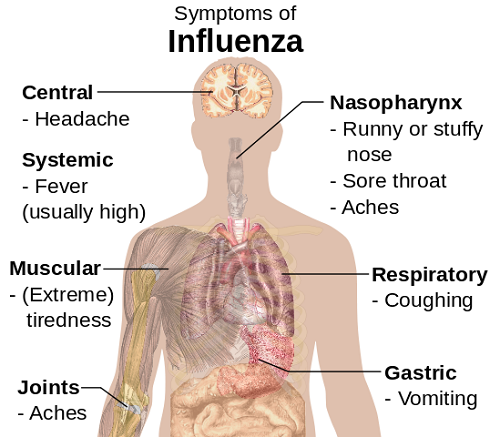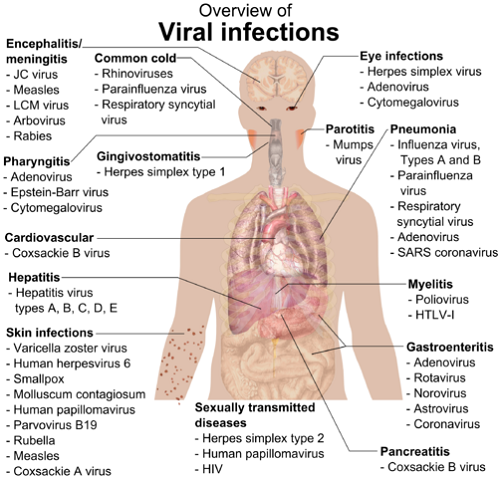Difference between the Flu and Stomach Bug
The Flu and stomach bug – aren’t they the same thing? Well, they may seem similar but they are definitely two different illnesses.
Flu
Flu or influenza is an infection that affects the respiratory system, specifically the nose, throat, and lungs. The “flu” is a term most people often use to describe any form of mild illness like a cold. Others even confuse influenza with stomach flu or gastroenteritis because some of the symptoms are similar.
Normally, however, the symptoms of flu are usually worse than a cold. They also last longer. And unlike gastroenteritis, the flu doesn’t cause vomiting and diarrhea in adults. (1) (2)
Symptoms
The flu causes fever, headache, body aches, a sore or dry throat, and dry cough. A person infected with the flu usually feels tired and exhibits loss of appetite since most food tastes bland. The worst of the symptoms are usually felt within the first three or four days but it can take as long as one to two weeks for the patient to become better completely. (1) (2) (3)
Causes
The flu is commonly caused by influenza viruses A and B. These viruses travel through the air when someone who has the infection talks, sneezes, or coughs. (4)
You can get the virus through direct contact, such as inhaling the droplets of saliva or mucus from the infected person or indirect contact by picking up objects the infected person has touched.
Flu viruses change constantly, with new strains developing every year.(1) (2)
Who are at risk?
Flu typically resolves on its own. However, influenza and its complications can be deadly for the following:
- Children below the age of 5, especially those younger than 2 years
- Adults over the age of 65
- Pregnant women
- Individuals with compromised immune systems
- Severely obese individuals or those with a BMI of 40 or higher
- Individuals with chronic illness like heart disease, kidney disease, asthma, and diabetes
- Individuals who reside in nursing homes and other long-term care facilities as well as military barracks(1) (4)
Complications
Influenza in healthy individuals is usually not serious, but children and adults who are at risk may develop complications such as asthma flare-ups, bronchitis(5), ear infections, heart problems, and pneumonia.
Pneumonia(6), which is the most serious complication of the flu, can cause death in people with a chronic disease as well as in older adults.
When to call the doctor
Most people who get the flu get better after taking over-the-counter medication and resting for a few days.(7) However, people who are at risk of complications need to contact the doctor right away.(2)
Stomach Bug
Stomach bug is the more common name for the condition called gastroenteritis, where the stomach and intestines (the gastrointestinal or GI tract) are irritated and inflamed. Either viral or bacterial infection is generally the cause of stomach bug, although gastroenteritis may also be caused by parasites, unclean water, or adverse reaction to food. (8) (9)
Symptoms
Also known as stomach flu, gastroenteritis is often mistaken for the flu or influenza because they share similar symptoms, with a few exceptions.(10)The main symptoms of stomach bug are vomiting and water diarrhea. The patient can also experience fever, nausea, cramping, stomach pain, and headache.
Symptoms can appear one to three days after you’re infected, and can range between mild and severe. While the symptoms of stomach bug usually last a day or two, they can sometimes persists for a long as 10 days.(11)
Causes
Gastroenteritis can spread through the following ways:
- Contact with someone infected by the virus
- Consuming contaminated food or water
- Not washing hands after changing a diaper or going to the bathroom
Stomach flu is often caused by a virus. Of the many different kinds of virus that cause gastroenteritis, rotavirus and norovirus are the main types. Rotavirus is the leading worldwide cause of diarrhea among infants and children while norovirus is America’s most common cause of serious gastroenteritis as well as disease outbreaks from food sources. (12)
E.coli and salmonella can also lead to stomach flu, although gastroenteritis from these causes is not common. These types of bacteria can spread by consumption of undercooked poultry, poultry juices, and eggs. Reptiles that are kept as pets and live poultry can also be carriers of salmonella.
Shigella, which can also cause stomach flu, is spread through the consumption of contaminated food and water. This bacterium is common in day care centers and is typically passed from one person to another.
Parasites such as girdia and cryptosporidium, which are found in swimming pools and contaminated drinking water can also cause gastroenteritis. However, stomach bug from these sources is uncommon. (13)
Other unusual ways to get gastroenteritis is by eating a lot of acidic foods, consuming toxins that may be present in some seafood, consumption of heavy metals that have found their way into drinking water, and certain medications.
Who are at risk?
Infants, pregnant women, people with compromised immune systems, and older adults are the most at risk of getting gastroenteritis. (14)
When to call the doctor
With the usual over-the-counter medications and bed rest, gastroenteritis typically goes away on its own. However, vomiting and diarrhea can lead to dehydration. (15) Dry skin, a dry mouth, extreme thirst, and lightheadedness are symptoms that you are dehydrated. When you experience these effects, contact your doctor immediately.
You should also call your doctor right away when you notice the following:
- Blood in the vomit or poop
- Fever that is 100.4 degrees F or over in infants or 102.2 degrees F or over in children or adults
- Vomiting that lasts more than 48 hours
- Swollen tummy or pain in the lower right part of the belly(10)
Gastroenteritis and Children
Children who contract gastroenteritis are especially at risk because they can get dehydrated easily.(15)If your child has dry skin or a dry mouth, becomes very thirsty, or has fewer and drier diapers, call your doctor right away for advice. In addition, you should first check with your doctor before giving your child medicine to treat the symptoms of stomach flu.
To prevent stomach flu, infants are given two vaccines to inoculate them against rotavirus, the most common cause of gastroenteritis in children.(16)
Anyone can become affected by the flu and gastroenteritis. If you’re a perfectly healthy individual, there’s nothing to worry about as long as you take the necessary steps to get better. However, if you are at risk of the complications or if you have a child who is, make sure to contact your physician for advice on what to do.
- Difference Between Snowstorm and Blizzard - December 18, 2018
- Difference Between Foreword and Preface - October 4, 2018
- Difference Between Shade and Shadow - October 3, 2018
Search DifferenceBetween.net :
Leave a Response
References :
[0]http://www.webmd.com/cold-and-flu/tc/influenza-topic-overview#1
[1]http://www.webmd.com/cold-and-flu/flu-guide/stomach-flu-not-influenza#1
[2]http://www.webmd.com/cold-and-flu/flu-guide/advanced-reading-types-of-flu-viruses#1
[3]http://www.mayoclinic.org/diseases-conditions/flu/home/ovc-20248057
[4]http://www.webmd.com/lung/understanding-bronchitis-basics#1
[5]http://www.healthline.com/health/pneumonia
[6]http://www.mayoclinic.org/diseases-conditions/flu/diagnosis-treatment/treatment/txc-20248141
[7]http://www.mayoclinic.org/diseases-conditions/viral-gastroenteritis/basics/definition/con-20019350
[8]http://www.webmd.com/digestive-disorders/gastroenteritis#1
[9]http://www.webmd.com/cold-and-flu/flu-guide/stomach-flu-not-influenza
[10]http://www.mayoclinic.org/diseases-conditions/viral-gastroenteritis/basics/symptoms/con-20019350
[11]http://www.mayoclinic.org/diseases-conditions/viral-gastroenteritis/basics/causes/con-20019350
[12]http://answers.webmd.com/answers/1181386/what-causes-gastroenteritis
[13]http://www.mayoclinic.org/diseases-conditions/viral-gastroenteritis/basics/risk-factors/con-20019350
[14]http://www.mayoclinic.org/diseases-conditions/viral-gastroenteritis/basics/complications/con-20019350
[15]http://www.webmd.com/children/features/the-truth-about-stomach-flu#1
[16]https://en.wikipedia.org/wiki/File:Symptoms_of_influenza.svg
[17]https://commons.wikimedia.org/wiki/File:Viral_infections_and_involved_species.png


